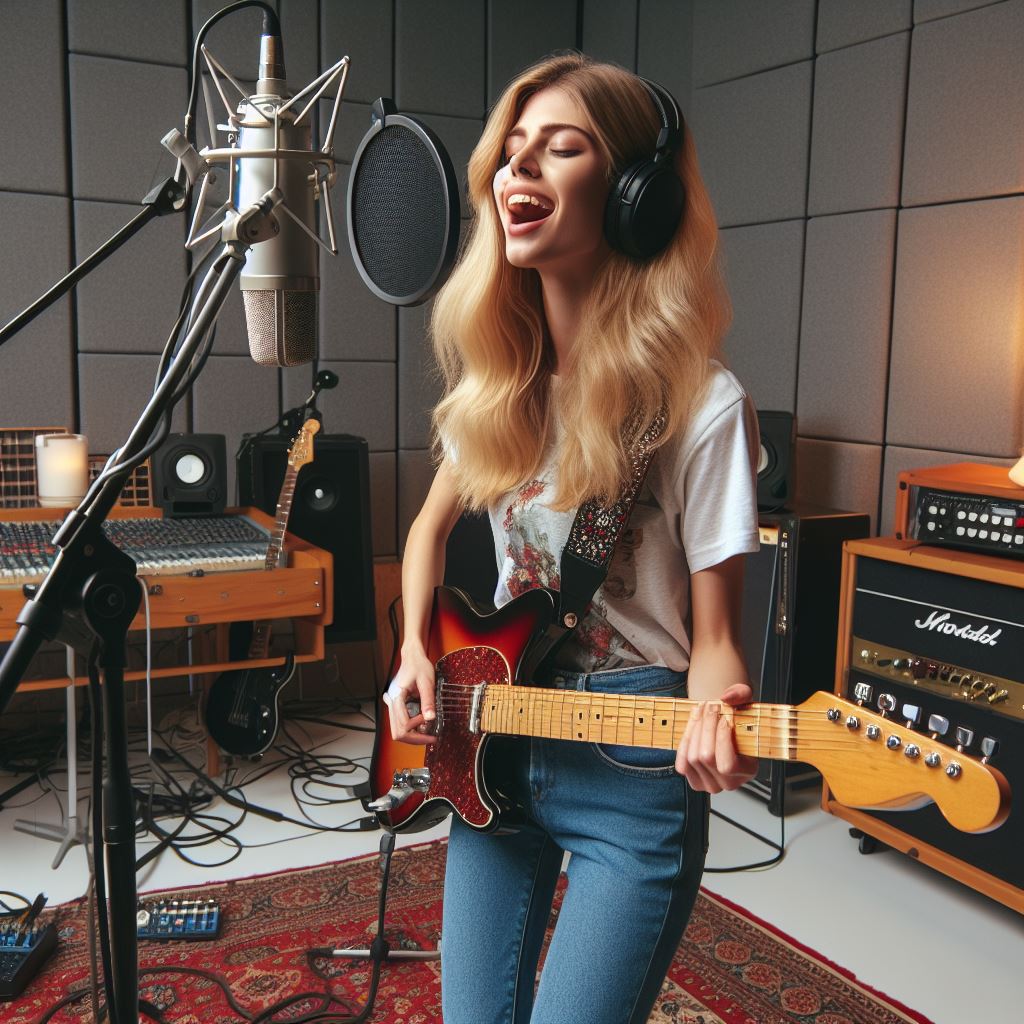Introduction
In the music industry in the UK, the topic of women’s presence and achievements holds great significance and relevance.
Discussing this topic sheds light on the challenges faced by women and the need for gender equality in the industry.
Significance and relevance of discussing this topic
It is crucial to explore the experiences of women in the music industry, as they often face barriers and discrimination.
By showcasing their accomplishments and struggles, we can create awareness and foster a more inclusive and equitable industry.
This topic also highlights the contributions of women in shaping the music landscape and their impact on cultural expression.
Recognizing their talent and achievements is essential for inspiring future generations of female musicians.
Furthermore, addressing the topic of women in the music industry provides an opportunity to examine the prevailing gender disparities and work towards fostering a more equitable and diverse environment.
By discussing the experiences and achievements of female artists, we can challenge the existing norms and pave the way for a more inclusive and equal industry.
Through this discussion, we can encourage the necessary changes required to ensure fair representation and opportunities for women in music.
Basically, the topic of women in the music industry in the UK is significant and relevant due to the barriers and discrimination they face.
By exploring this topic, we can promote gender equality and create a more inclusive industry for all.
Historical Overview
Throughout history, women have played a significant role in the music industry in the UK.
However, their involvement has been marked by numerous challenges and barriers that they had to overcome.
This section provides a brief history of women’s involvement in the music industry, the challenges they faced, and highlights key milestones and achievements.
Challenges and barriers faced by women in the past
In the early days of the music industry, women had limited opportunities to participate.
Personalized UK Career Consulting
Receive tailored career guidance designed just for you. Get actionable steps and expert support to boost your career in 1-3 days. Take control of your career now.
Get StartedThey were often relegated to roles such as singers or performers, with little control over their own careers.
The industry was dominated by men who held positions of power and decision-making authority.
One of the major challenges faced by women was the pervasive sexism and gender discrimination that existed in the music industry.
They were often subjected to objectification and faced stereotypes that undermined their talent and abilities.
Additionally, women were often paid less than their male counterparts for performing similar roles.
Key milestones and achievements of women in music
Despite these challenges, women in the music industry made significant strides and achieved important milestones.
One notable milestone was the emergence of women-led bands and musical groups in the late 1960s and 1970s.
Artists like Kate Bush, Annie Lennox, and Siouxsie Sioux broke new ground and paved the way for future generations of female musicians.
The 1980s witnessed a surge in female artists who not only achieved commercial success but also challenged gender norms through their music.
Figures like Madonna and Janet Jackson pushed boundaries and used their platform to address social issues, further empowering women in the industry.
In the 1990s, the riot grrrl movement emerged, emphasizing female empowerment and addressing issues of sexism and misogyny in the music industry.
Bands like Bikini Kill and Sleater-Kinney inspired a new wave of female musicians, encouraging them to take control of their own narratives and challenge societal expectations.
As we entered the 21st century, the presence and influence of women in the music industry continued to grow.
Artists like Adele, Beyoncé, and Taylor Swift achieved global recognition and success, challenging stereotypes and achieving unprecedented levels of commercial and critical acclaim.
Your Dream Job Starts with a Perfect CV
Get a tailored CV and cover letter that captures your unique strengths and stands out in your industry. Let us help you make an unforgettable first impression.
Get StartedGreater recognition of the need for gender equality in the music industry
In recent years, there has been a greater recognition of the need for gender equality in the music industry.
Initiatives such as the Key change project, which aims to achieve a 50:50 gender balance in the industry by 2022, have been instrumental in promoting and supporting women in music.
Despite the progress made, challenges and barriers still persist for women in the music industry.
The gender pay gap continues to be a significant issue, with women often receiving less pay for their work compared to male counterparts.
Additionally, women remain underrepresented in key decision-making roles within the industry, including executive positions and producer roles.
In general, women have played a crucial role in the music industry in the UK throughout history.
Despite facing numerous challenges and barriers, they have achieved significant milestones and continue to shape and influence the industry today.
However, there is still much work to be done to achieve true gender equality in the music industry.
Read: The Impact of Brexit on UK Musicians
Current Landscape
Overview of the current representation of women in the music industry in the UK
Women in the music industry in the UK face various challenges and obstacles in achieving equal representation and recognition.
While progress has been made in recent years, there is still a significant underrepresentation of women in certain roles, particularly technical and executive positions.
Currently, women face a lack of representation in the music industry, with men dominating the majority of roles.
This gender imbalance is apparent across various sectors, including record labels, music production studios, and live event management companies.
The underrepresentation of women in certain roles
One area where women are particularly underrepresented is in technical positions.
Optimize Your LinkedIn for Success
Boost your LinkedIn profile with a professional bio, keyword-rich headline, and strategic recommendations that attract recruiters. Stand out from the crowd and get noticed.
Optimize NowSound engineers, studio producers, and other technical roles are traditionally male dominated, making it difficult for women to break into these fields.
This lack of diversity not only limits opportunities for women but also hinders the overall creativity and innovation within the industry.
In addition to technical positions, women also face challenges in securing executive roles within the music industry.
Women are often overlooked for positions in artist management, A&R, and executive boards of major record labels.
This underrepresentation in decision-making roles perpetuates gender bias and limits the opportunities for talented women to influence and shape the industry.
Successful women artists, producers, and executives in the industry
Despite these challenges, there are numerous successful women artists, producers, and executives who have made significant contributions to the UK music industry.
Artists like Adele, Dua Lipa, and Florence Welch have achieved tremendous success and have become role models for aspiring women musicians.
Their talent, determination, and perseverance have paved the way for future generations of women artists.
Women are also making strides in the production realm.
Producers like Imogen Heap and Mica Levi have gained recognition for their exceptional work and have challenged the traditional notion that music production is a male-dominated field.
Their success serves as an inspiration for aspiring female producers and encourages the industry to be more inclusive.
Moreover, women executives in the music industry are breaking barriers and making their mark.
Emma Banks, one of the industry’s most influential talent agents, has been instrumental in the success of numerous artists and has proven that women can excel in executive roles.
Other notable women executives include Rebecca Allen, President of Decca Records, and Alison Donald, Co-President of Columbia Records UK.
Addressing the Challenges
It is crucial for the music industry to address the underrepresentation of women in various roles and create an inclusive environment that encourages and supports their participation and success.
Initiatives like the Keychange program, which aims to achieve gender parity at music festivals, and various mentorship programs are steps in the right direction.
By actively promoting and supporting talented women in the industry, the UK music industry can foster a more diverse and innovative landscape.
Promote industry thriving by actively valuing and celebrating women’s voices and contributions through equal representation and recognition.
Read: Navigating Music Contracts in the UK
Gender Disparities
The music industry in the UK, like many other industries, has a long-standing history of gender disparities.
Factors contributing to gender disparities in the UK music industry
Despite progress being made in recent years, there are still significant factors contributing to the gender imbalances within this field.
- Lack of representation: One of the major factors is the lack of female representation in key roles such as producers, label executives, and music directors. This underrepresentation limits the opportunities available for women to succeed and advance in their careers.
- Unconscious biases: Unconscious biases continue to plague the music industry, often subconsciously affecting decisions made regarding female artists. These biases can manifest in the form of stereotypes about women’s abilities or the value of their work. Such biases can hinder their chances of being recognized and given equal opportunities.
- Discrimination: Discrimination against women in the UK music industry can manifest in various ways. They may face challenges such as unequal treatment, lower pay compared to male counterparts, and limited access to resources and funding. This discrimination can create barriers that hamper their progress and restrict their professional growth.
- Gender pay gap: The gender pay gap is a glaring issue within the music industry. Women consistently earn less than men, be it in performance fees, royalties, or salaries for industry roles. This pay disparity not only affects their financial standing but also reflects a lack of value placed on their contributions.
- Limited opportunities: Women often face unequal opportunities in terms of performance opportunities, signing record deals, and securing positions within the industry. This lack of equal opportunities prevents them from reaching their full potential and hampers their ability to build successful careers.
Additional Factors
- Cultural and historical factors: The music industry, like society at large, has been deeply influenced by cultural and historical factors that perpetuate gender disparities. Traditional gender roles and stereotypes have shaped perceptions of women in music, creating barriers that limit their advancement.
- Lack of mentorship and support: Women in the UK music industry often lack mentorship and support networks that could help them navigate challenges and overcome obstacles. Mentorship plays a crucial role in career development, and the absence of guidance can further hinder their progress.
- Inadequate recognition: Women’s contributions to the music industry are often undervalued and go unrecognized. This lack of recognition reinforces the dismissal of women’s achievements and further perpetuates gender disparities.
- Societal expectations and pressures: Societal expectations, such as the pressure to conform to certain beauty standards or to prioritize family over career, can affect women in the music industry. These expectations often serve as additional hurdles and can limit their professional growth.
- Toxic work environments: The music industry has a reputation for fostering toxic work environments, including instances of harassment and abuse. Such environments disproportionately affect women, making it harder for them to thrive and succeed.
To create a more inclusive and equal UK music industry, we must actively address gender disparities through concerted efforts.
Organizations and individuals within the industry must actively work towards breaking down barriers and biases, providing equal opportunities for women, and promoting a culture of respect and support.
Ultimately, by acknowledging and addressing the factors contributing to gender disparities, the music industry can become a more balanced and equitable space where all artists, regardless of their gender, have an equal chance to succeed and thrive.
Read: UK Music Festivals: A Musician’s Role

Initiatives and Progress
Ongoing initiatives and organizations working to address gender disparities in the industry
Gender disparities in the music industry have been a longstanding issue, but there are several ongoing initiatives and organizations that are working tirelessly to address this imbalance.
Through their efforts, progress is being made, and positive changes are starting to take place.
Impact of campaigns like the PRS Foundation’s Keychange and the Women in Music Network
One notable campaign that has had a significant impact is the Keychange initiative led by the PRS Foundation.
This campaign aims to achieve a 50:50 gender balance in festival lineups by 2022.
By encouraging festivals to sign up to this pledge, Keychange has already seen a significant increase in the number of female performers and artists featuring on stages across the UK.
The campaign has highlighted the need for diversity and inclusion, and it continues to gain momentum.
Furthermore, the Women in Music Network has been instrumental in providing support and opportunities for women in the music industry.
This organization brings together like-minded individuals who are passionate about promoting gender equality.
Through networking events, mentorship programs, and workshops, the Women in Music Network offers a supportive space for women to connect, learn, and grow in their respective careers.
Examples of policy changes and advancements made in promoting gender equality
Policy changes have also played a crucial role in advancing gender equality in the UK music industry.
Organizations like UK Music and the Incorporated Society of Musicians have been working closely with government bodies to implement changes that make a real difference.
For example, there has been an increased focus on transparent hiring processes and gender-balanced interview panels within music companies.
This has helped to address unconscious biases and create fairer opportunities for all.
The music education sector has also seen positive developments in recent years.
Schools and colleges must ensure equal opportunities for male and female students to actively engage in music programs.
This not only helps to address gender disparities from a young age but also encourages the next generation of women to pursue careers in music confidently.
It’s important to highlight the success stories of women in the industry who have broken barriers and achieved great milestones.
Artists like Adele, Dua Lipa, and Laura Mvula have demonstrated immense talent, proving that gender should not be a limiting factor in a person’s success.
Their achievements inspire aspiring musicians and reaffirm the need for equal representation across the board.
Cultural Shift within the Music Industry
In addition to these initiatives, a cultural shift is also occurring within the music industry.
There is a growing recognition that diverse voices and perspectives are crucial for creativity and innovation.
Music professionals are becoming more aware of the importance of promoting gender equality, not just for the sake of fairness, but also to foster a richer and more dynamic industry.
We’ve made progress, but there’s more work. Keep supporting and championing these crucial initiatives for continued success.
The music industry must strive for inclusivity and actively work towards breaking down barriers that prevent women from fully participating and thriving in all areas.
In essence, ongoing initiatives and organizations are driving positive change in the UK music industry.
Campaigns like Keychange and the Women in Music Network are creating new opportunities and platforms for women, while policy changes and advancements are promoting gender equality.
These efforts, combined with cultural shifts and increased awareness, are slowly but surely closing the gender gap and building a more balanced and inclusive music industry.
Read: The Evolution of UK Music Genres
Challenges and Future Outlook
Current Challenges faced by Women in the UK Music Industry
- Lack of representation and opportunities for women in leadership positions.
- Gender bias and stereotyping in the music industry, leading to limited exposure and recognition for female artists.
- Pay disparity and unequal treatment between male and female musicians.
- Female artists often face pressure to conform to certain standards of appearance and behavior.
The Importance of Creating Safe and Inclusive Spaces for Women in Music
- Safe and inclusive spaces are crucial for empowering women and providing them with equal opportunities.
- These spaces allow women to freely express themselves, collaborate, and network with other female professionals.
- By fostering a supportive environment, women can feel more comfortable taking risks and pursuing their musical aspirations.
- Inclusive spaces also encourage diversity, leading to a broader range of voices and perspectives in the industry.
Suggestions for Future Actions to Create a More Equitable Industry
- Promote gender diversity in decision-making positions within record labels, management companies, and talent agencies.
- Increase funding and support for organizations that focus on empowering and mentoring women in the music industry.
- Implement quotas or targets for gender diversity at festivals, award shows, and industry conferences.
- Provide training and education programs to address gender bias and inequality.
- Encourage collaboration and networking opportunities specifically for female musicians to build a strong support system.
- Celebrate and highlight the achievements of women in music through media coverage and industry recognition.
In a nutshell, although progress has been made, there are still significant challenges that women in the UK music industry face.
Creating safe and inclusive spaces is vital for empowering women and providing equal opportunities.
By taking action, such as promoting gender diversity, improving representation, and providing support and mentorship, the industry can move towards greater equity and inclusivity.
It is essential for all stakeholders to work together to ensure a future where women in music can thrive and reach their full potential.
Conclusion
This blog post has highlighted several key points regarding women in the music industry in the UK.
We have seen the challenges they face in terms of representation, opportunities, and gender disparities.
It is crucial to emphasize the importance of empowering and supporting women in the music industry.
Tap into overlooked talent and creativity by offering equal opportunities and platforms for all.
Promoting gender equality in music is not just about fairness; it is about enriching the industry as a whole.
When we support women in music, we are paving the way for a more inclusive and diverse industry that benefits everyone.
Therefore, I encourage all readers to continue supporting and promoting gender equality in music.
Attend concerts and events featuring female artists, listen to their music, and engage with their work.
Share their music and stories on social media, actively advocate for their representation in industry decision-making spaces to amplify their voices.
By working together, we can create a music industry that truly reflects the talent and contributions of women, empowering them to achieve their fullest potential.
Let us stand united in our commitment to breaking barriers and promoting gender equality in music.
[E-Book for Sale]
500 Cutting-Edge Tech Startup Ideas for 2024 & 2025: Innovate, Create, Dominate
$19.99 • 500 Tech Startup Ideas • 62 pages
You will get inspired with 500 innovative tech startup ideas for 2024 and 2025, complete with concise descriptions to help you kickstart your entrepreneurial journey in AI, Blockchain, IoT, Fintech, and AR/VR.




